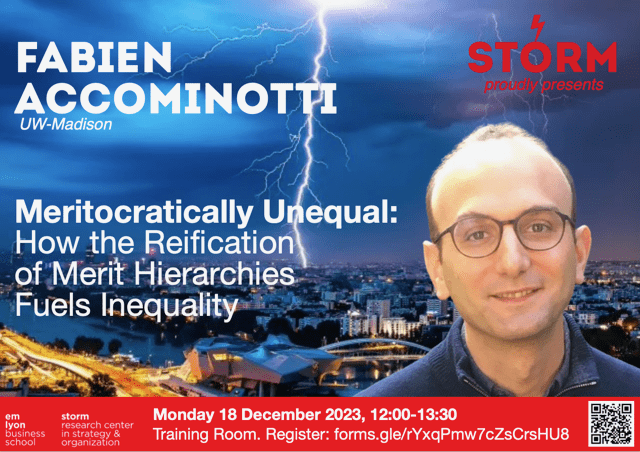Meritocratically Unequal: How the Reification of Merit Hierarchies Fuels Inequality
About the Research
In a variety of social contexts, evaluating merit or performance is a crucial step toward enforcing meritocratic ideals. Yet evaluation often obfuscates the empirical complexity of merit and instead reifies merit hierarchies into artificially crisp and clear-cut constructs. This talk explores how the reification of merit hierarchies shapes inequality in the rewards received by the winners and losers of meritocratic contests. Specifically, I report the findings of a pre-registered experiment asking participants to divide a year-end bonus among a set of three, unequally performing employees, based on the reading of their annual performance reviews. In the experiment’s low-reification condition, reviews are narrative evaluations. In the medium- and high-reification conditions, the same narrative evaluations are accompanied by summary verbal ratings and by numerical ratings, respectively. I find that participants reward employees more unequally when the performance hierarchy is more reified, even though the experiment’s design ensures that employees’ perceived levels of performance and relative performance do not vary across experimental conditions. Further analyses suggest that reification does not fuel inequality by reinforcing the trustworthiness of evaluation, but by making participants understand merit in more hierarchical terms. These findings more broadly demonstrate the usefulness of centering the characteristics of status hierarchies as hierarchies for understanding how status processes shape inequality.
About Fabien Accominotti
Fabien Accominotti is an Assistant Professor of Sociology at the University of Wisconsin–Madison. His research explores the formation and demise of status hierarchies and their role in sustaining inequality in society. His work has appeared in the American Journal of Sociology, the American Sociological Review, the American Behavioral Scientist, and the British Journal of Sociology, among other outlets. He is currently completing a book on the Paris art world between 1870 and 1930, where he shows how, in the heyday of French modernism, art market actors made modern art valuable by telegraphing the existence of a reliable hierarchy of worth among artists in a field otherwise premised on permanent aesthetic revolution.
Date: Monday 18 December, 2023
Time: 12:00-13:30 CET
Venue: Training Room (Zoom link provided to registered attendees)
Should you want to attend, please register at https://forms.gle/rYxqPmw7cZsCrsHU8


